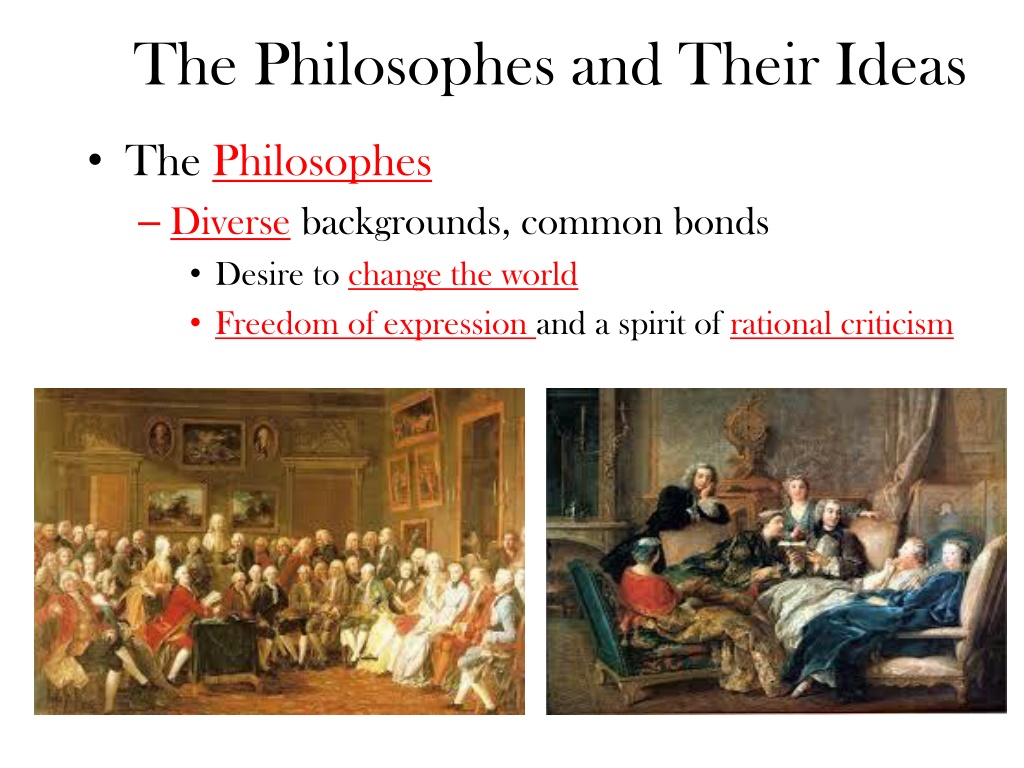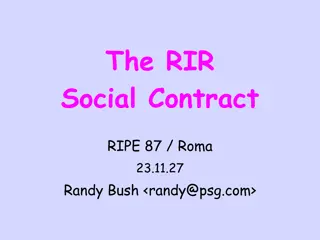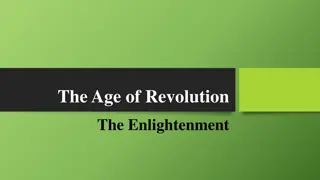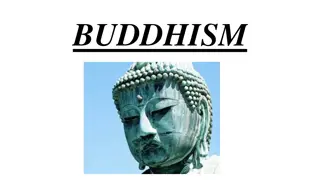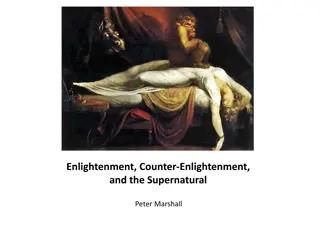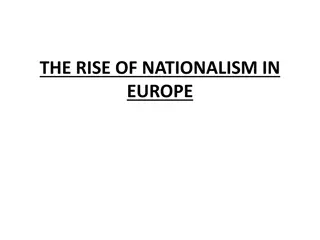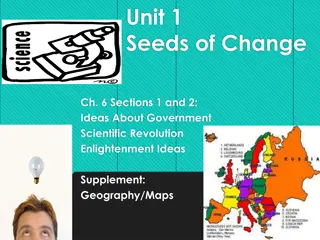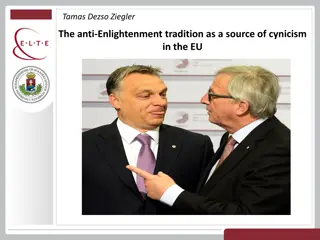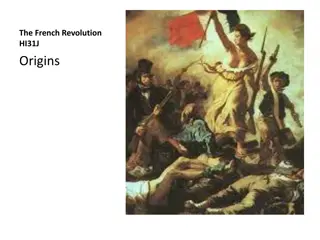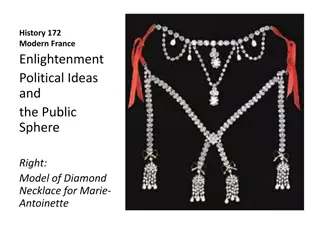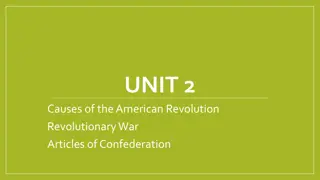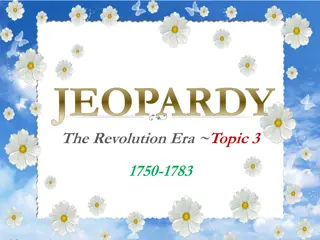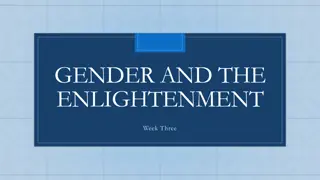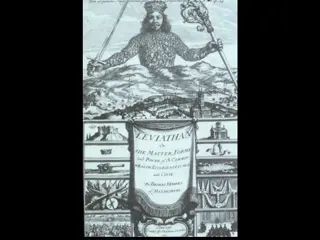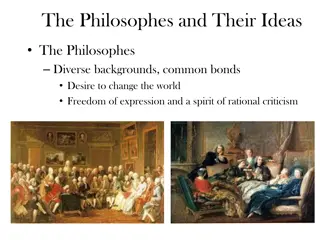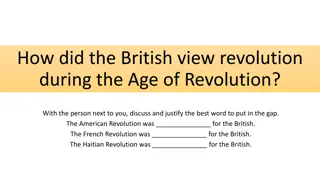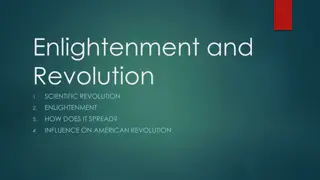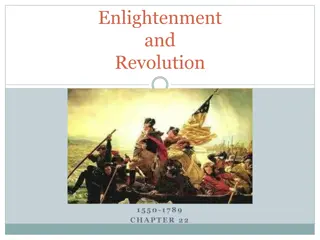Enlightenment Philosophes and Their Revolutionary Ideas
Enlightenment philosophes such as Montesquieu, Condorcet, Voltaire, John Locke, Diderot, and Cesare Beccaria came from diverse backgrounds but shared a common desire to change the world. They advocated for freedom of expression, rational criticism, religious tolerance, separation of powers, educational reform, women's rights, abolition of slavery, and legal reform. These influential figures challenged traditional beliefs, promoted reason, and laid the foundation for modern democratic ideals and human rights.
Download Presentation

Please find below an Image/Link to download the presentation.
The content on the website is provided AS IS for your information and personal use only. It may not be sold, licensed, or shared on other websites without obtaining consent from the author. Download presentation by click this link. If you encounter any issues during the download, it is possible that the publisher has removed the file from their server.
E N D
Presentation Transcript
The Philosophes and Their Ideas The Philosophes Diverse backgrounds, common bonds Desire to change the world Freedom of expression and a spirit of rational criticism
Montesquieu Baron de Montesquieu (1689 1755) and Political Thought Persian Letters, 1721 Attacks on traditional religion and slavery, advocacy of religious toleration and reason The Spirit of the Laws, 1748 Separation of powers
Condorcet (1743 Condorcet (1743- -1794) 1794) French philosopher and mathematician Influenced by Turgot and Voltaire - Vie de M. Turgot 1786 and Vie de Voltaire in 1789. Educated at a Jesuit college Advocate of educational reform, women s rights, religious toleration, legal reform such as the abolition of slavery and equal rights for women.
Voltaire (1694 Voltaire (1694- -1778) 1778) French philosopher Voltaire (1694 1778) and the Enlightenment Philosophic Letters on the English (1733) Indictment of French absolutism Criticism of traditional religion and intolerance The Calas affair Treatise on Toleration, 1763 Deism
John Locke (1632 John Locke (1632- -1704) 1704) English philosopher Influenced by Descartes and Bacon Govt. exists to preserve life, liberty and property. Two Treatises of Government (1689) Advocate of religious toleration People are born a blank slate (tabula rasa)
Diderot (1713-1784) French philosopher, art critic, and writer Best known for serving as co-founder, chief editor, and contributor to Encyclopedie (1745- 1772) Goal: change the general way of thinking Contributors to 28-volume collection expressed major concerns Attacks on religious superstitions Advanced a program for social, legal, and political improvements Lowered price helped spread Enlightenment ideas
Cesare Beccaria (1738-1794) Italian criminologist, influenced by Montesquieu Govt. policy should seek the greatest good for the greatest number. Against torture and secret proceedings, and brutal punishments. On Crimes and Punishment, 1764.
Adam Smith (1723-1790) English economist Rejection of mercantilism in favor of supply and demand laissez-faire economics The Wealth of Nations, 1776 Promotion of free trade Government has only three basic functions Protect society from invasion Defend individuals from injustice and oppression Keep up public works
Thomas Hobbes (1588-1679) English philosopher worked for the Cavendish family and traveled Europe, meeting Galileo and Descartes. Humans are selfish and absolute monarchy was the best way to rule. Leviathan, 1651
Mary Wollstonecraft (1759-1797) English writer and passionate advocate of educational and social equality for women. Founder of modern feminism Vindication of the Rights of Woman (1792) Subjection of women by men wrong
Jean Jacque Rousseau (1712-1778) Swiss-born philosopher, writer, and political theorist. Treatises and novels inspired leaders of the French Revolution The Social Contract (1762) and the Discourse of the Origin of Inequality (1755) People are generally good but become corrupted by society Legitimate government only comes from consent of the people
Enlightened Absolutism Toleration of religious minorities Reform of institutions Absolutism Patronage of the philosophes
Catherine II or Catherine the Great (1729-1796) Empress of Russia (1742-1796) Overthrew her husband, Peter III. Dependence on nobility led to little reform Purchased Diderot s library and made him librarian.
Frederick II (the Great) of Prussia (1712-1786) First servant of the state Anti-Machiavelli - govt. should be concerned with the well-being of the population. Religious toleration but favored Protestants. Civil service reform people promoted on merit, not family ties.
Joseph II of Austria (1741-1790) Most radical but least effective enlightened absolute leader . Religious toleration policy allowed private worship of Jews. Attempted to centralize, challenged by nobles and multi-ethnic empire. Reform abolished serfdom and granted more rights than before.
David Hume (1711-1776) Scottish philosopher, historian, economist Influenced by Newton and Locke No reality is possible; there can be no knowledge of anything beyond experience. Enquiry Concerning the Principles of Morals human morality and sympathy.
